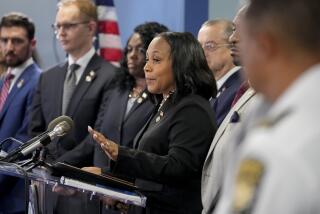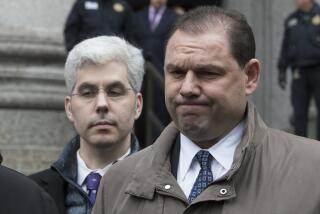More Lawmakers Fall in Bribery Probe : Government: Nearly a tenth of South Carolina’s legislators have either admitted or been convicted of wrongdoing. More than 40 cases are still being investigated.
- Share via
COLUMBIA, S.C. — It is summer in South Carolina. The palmetto trees are swaying. The tobacco and soybeans are growing. The politicians are sweating--and not because of the weather.
The birthplace of the Confederacy is sweltering through a wave of scandal.
Nearly a tenth of the state’s 170 legislators have admitted or been convicted of taking bribes. Top associates of the governor possessed cocaine and tampered with federal witnesses. A judge, once a legislator, was convicted in a vote-selling scheme. The state university’s former president pleaded guilty to accepting money above his salary and no contest to tax evasion.
The state’s top police officer says his department is investigating 44 corruption cases, a half-dozen in cooperation with the federal government.
“I’m embarrassed for the people of South Carolina,” said Cliff Wilson, a dentist in Darlington.
In February, Wilson and about 60 other Darlington residents paid $450 for an advertisement in a local newspaper that read: “We, the people of South Carolina, DO CARE about ethics reform. We will be watching and waiting.”
Gov. Carroll A. Campbell Jr. admits that his state’s reputation has been sullied.
“People ask all the time . . . ‘What in the world is going on down there? . . . Do you have a quorum left in your Legislature?’ Kind of snide remarks,” Campbell said. “I’m tired of answering questions about it everywhere you go.”
Not all of the larger scandals involve elected officials--James B. Holderman, big-spending former president of the University of South Carolina, was placed on five years’ probation after he pleaded guilty to keeping for personal use a $25,000 gift to the school, and no contest to tax evasion.
But the centerpiece of South Carolina’s disgrace is the state government, thanks to “Operation Lost Trust,” an FBI sting investigation.
A former legislator-turned-lobbyist, Ron Cobb, was caught in a cocaine transaction and became an FBI informant. He offered bribes to lawmakers if they voted for a bill to allow voters to legalize betting on dog or horse races.
The meetings were videotaped, of course, and South Carolinians have been offered a chance to watch their legislators in action--taking hundreds and in some cases thousands of dollars in exchange for their support.
Twenty-seven people, including 17 current or former lawmakers, faced bribery or drug charges as a result. All but two either have pleaded guilty or been convicted. Former Rep. Jack Rogers, the second-ranking member in the state House, pleaded guilty to racketeering.
The governor’s office was not spared. Dick Greer, a longtime Campbell friend, political strategist and the state’s chief economic recruiter, pleaded guilty to cocaine possession. David Hawkins, Campbell’s former top legislative aide, pleaded guilty to obstruction of justice.
Is there something about South Carolina that breeds this kind of scandal? James C. Edwards, a Furman University philosophy professor who specializes in ethics says there is not “endemic corruption” in the state.
“South Carolina is not a scandal state,” agrees the governor, pointing to similar bribery scandals in West Virginia and Arizona.
But the sting exposed the cozy ties between lobbyists and lawmakers, where some lawmakers sponged meals, trips, liquor and drugs off influence-peddlers.
Also spotlighted were abuses in campaign financing. State law allows unlimited contributions by any donor--individuals, businesses, unions--and politicians can use surplus funds for personal use.
“We probably have more abuse of office in this state than the average state,” says John Crangle of Common Cause, a citizens watchdog group.
Ethics laws are lax, he said, and law enforcement agencies traditionally are unwilling to take on political heavyweights.
And though the bribery scandal first broke last summer, there has been little progress toward toughening the laws.
Lawmakers spent more than five months bickering over reform bills that cover lobbyist rules, campaign finance, public officials’ conduct and conflicts of interest. But they adjourned June 6 without a deal.
Campbell, the second Republican governor since Reconstruction, has taken the offensive with major plans to restructure government. He wants to strengthen the governor through an executive cabinet and trim the bureaucracy.
More to Read
Sign up for Essential California
The most important California stories and recommendations in your inbox every morning.
You may occasionally receive promotional content from the Los Angeles Times.













